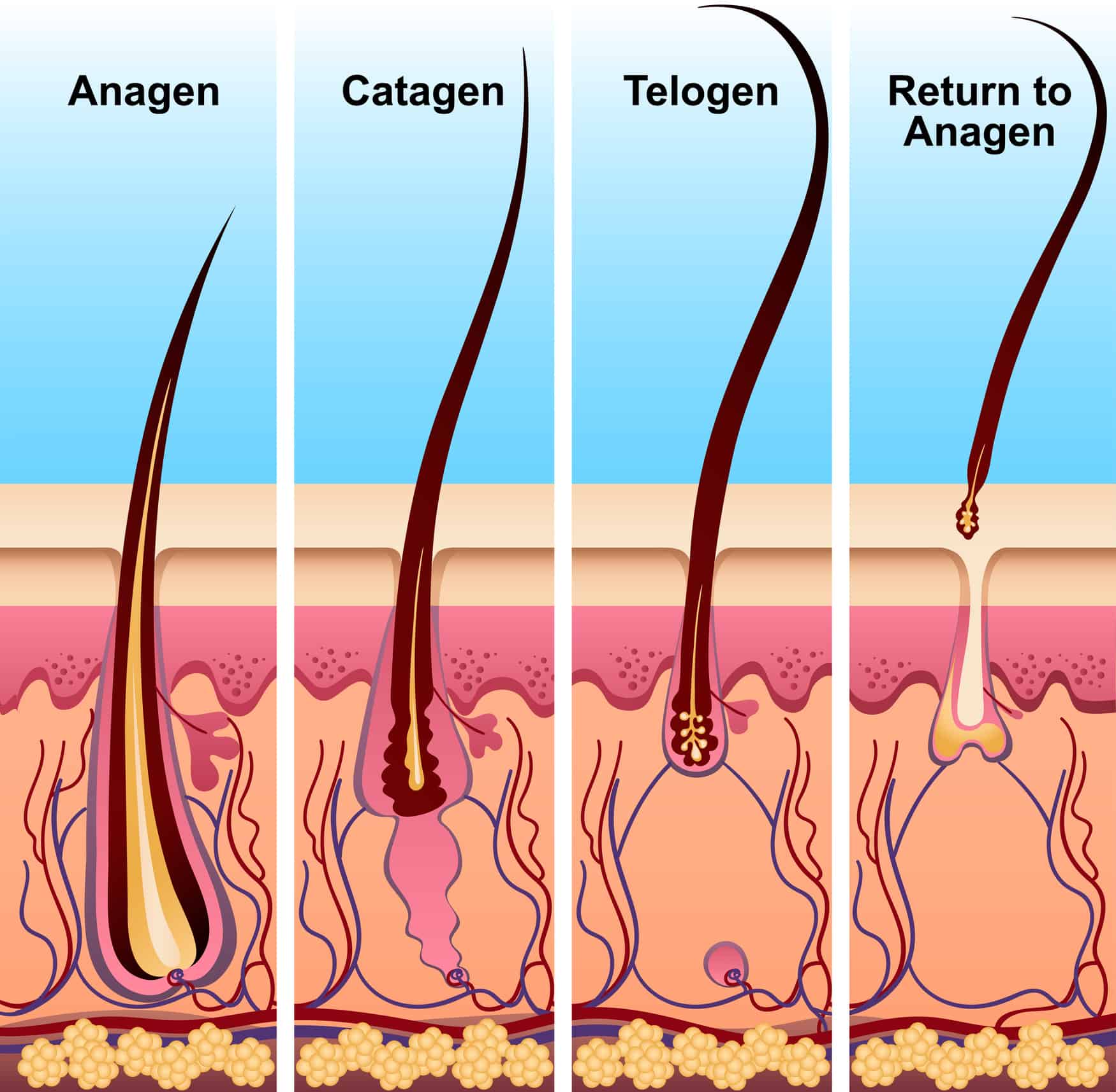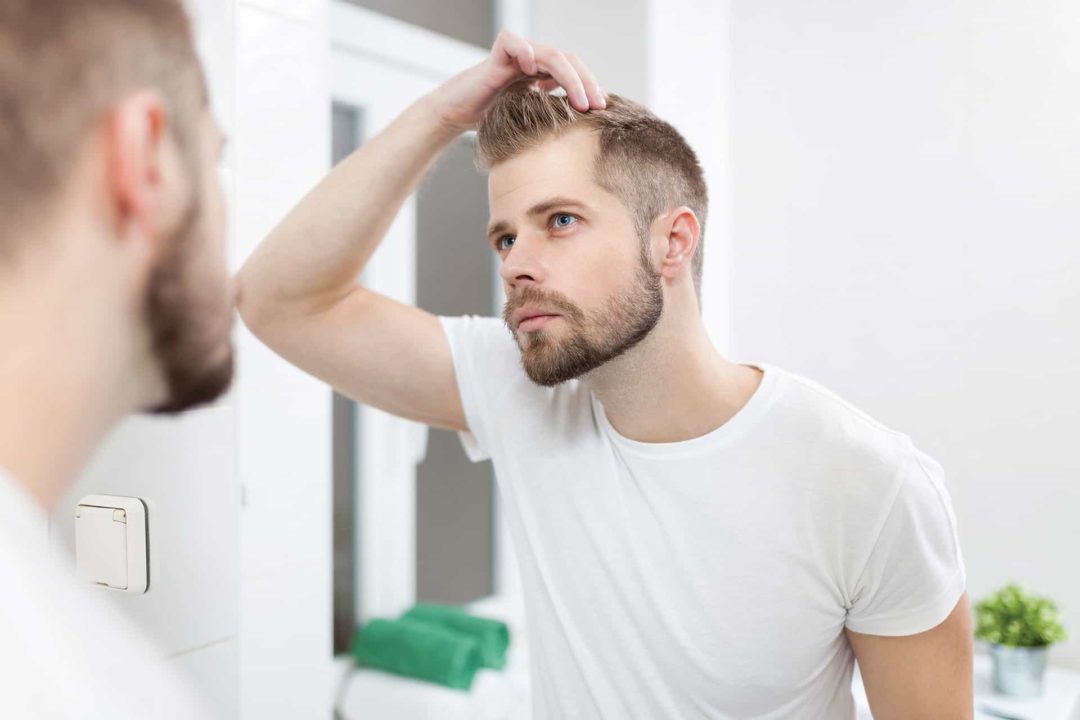The latest science on hair thinning was on display at the Naturally Informed eventNutri-Beauty: Mastering the Market, where Sophia Kogan, M.D., Co-Founder and Chief Medical Advisor at Nutrafol, gave a talk titled Getting to the Root of the Issue, focused fully on hair loss.
“I think most of us think of it as something that is purely genetic,” Dr. Kogan said, “and a lot of us don’t know that there’s actually a multifactorial ideology to hair thinning.” Causes she listed included stress, inflammation, nutrition, hormones, and more.

Dr. Kogan also covered the hair growth cycle (see Figure 1). It begins with the anagen phase, which is the growth phase; from there, it goes into the regression phase, which, she said, is a normal part of the cycle; and then it enters the resting phase, or the telogen phase, wherein the follicle does nothing except wait to fall out, which is called the exogen. The follicle will then, theoretically, produce another hair. However, at any point, any number of factors could act to speed up the cycle and cause hair to fall out faster, or even to prevent the follicle from regenerating once a hair falls out.
Nutrafol offers four products—one for men, one for women, one for postpartum people, and one for those who are peri- and post-menopause. All are intended to address the various factors that could affect hair growth and hair loss, from the hormonal to the environmental, and all are scientifically backed.
The Mayo Clinic notes that while hair thinning is often normal, it may be worth talking to a doctor about—full-body hair loss, patches of scaling, sudden or patchy hair loss, or more hair loss can usual can all be signs of an underlying medical condition (2). Your customers also may want to explore natural and preventative options. Looking at a preemptive approach, it may be useful for some customers to pinpoint a specific area that could affect hair health, and find ways to address it naturally.
Three areas of high importance:
Stress.Stress has been a global issue for years, and it’s getting worse, as thatTimes article shows. And Dr. Kogan pointed out that 78% of adults say that the COVID-19 pandemic is a significant source of stress in their life. Stress specifically leads to what Dr. Kogan calls Telogen Effluvium—stress-related shedding, wherein the follicle is pushed into the telogen stage, from which there is no way back. COVID led to a rise in Telogen Effluvium both in people who got COVID, and in people who were stressed about it.
Fortunately, there are plenty of well-studied aids out there. One stand-out: ashwagandha. Two 2019 studies both found that ashwagandha—240mg/daily in one study and 250mg/daily in the other—significantly lowered anxiety and cortisol, and one found that participants taking ashwagandha had significant improvement in sleep quality (3, 4).
Another useful option: L-theanine. A review article that looked into nine studies concluded: “The supplementation of L-theanine in its pure form at dosages between 200–400 mg/day may help reduce stress and anxiety acutely in people undergoing acute stressful situations, but there is insufficient evidence to suggest it assists in the reduction of stress levels in people with chronic conditions. However, the results of this study suggest that L-theanine taken during times of heightened acute stress or by individuals with a high propensity for anxiety and stress may exhibit beneficial properties via the increased production of alpha waves and decrease of glutamate in the brain” (5). It may, therefore, be useful to recommend to someone who needs an assist for a specific stressful situation.
Inflammation.The hair follicle requires energy for hair growth—and cellular metabolism provides that energy. Inflammation is a major strain on metabolism. Therefore, anti-inflammatories, such as curcumin, can provide help here. A 2021 review looked at 32 trials to evaluate the efficacy of curcumin supplementation on systemic inflammation, and found a reduction in inflammatory markers CRP, IL-6, and TNF-a, among others. The researchers concluded: “These findings provide evidence for the anti-inflammatory effects of curcumin and support further investigation to confirm dose, duration, and formulation to optimize anti-inflammatory effects in humans with chronic inflammation” (6). A 2020 study looked at mechanism of action, and found that curcumin can cross the blood-brain barrier, suggesting that it can protect the neurons from oxidative stress and inflammation. The study also found that it may play a role in cardiological protection, and it may help protect liver and spleen against oxidative and inflammatory injury (7).
Nutrition.Poor nutrition—besides impacting cellular metabolism—can result in a dearth of the nutrients required to build hair. Andra Picincu, Certified Nutritionist, wrote for SFGATE that the top nutrient required for hair is protein: “Because your hair, skin and nails are mostly made of protein, this nutrient should come first on your list. Eat more fish, eggs, lean meat, nuts, seeds, and cottage cheese” (8). Omega-3s help regulate keratin production, as well, making fish double-recommended. And since keratin can’t be made without zinc, Picincu recommends zinc-rich foods including oysters, beef, kidney beans, nuts, and fortified cereals.
Plus, Mayo Clinic suggests certain lifestyle tips for preventing hair loss (2): protect hair from sunlight and other sources of UV rays; avoid harsh hair treatments such as hot rollers, curling irons, hot-oil treatments, and perms; use a detangler and avoid tugging on hair when brushing, especially when wet; and limit tension on hair from rubber bands, barrettes, and braids.
Looking for more on the science behind hair loss? Head towww.NaturallyInformed.netand register for free to view theNutri-Beauty: Mastering the Market conference on-demand, which includes Dr. Kogan’s talk. Dr. Kogan discussed specific mechanisms by which these factors caused hair thinning, the gut-brain-hair axis, and more.WF
References
- Jessica Schiffer, "You’re Not Imagining It: The Pandemic Is Making Your Hair Fall Out." New York Times. Posted 02/18/2021. Accessed 10/11/2021. https://www.nytimes.com/2021/02/18/style/hair-loss-coronavirus-pandemic.html
- Mayo Clinic Staff, “Hair Loss.” www.MayoClinic.org. Accessed 10/11/2021.
- Adrian Lopresti et al., “An investigation into the stress-relieving and pharmacological actions of an ashwagandha (Withania somnifera) extract: A randomized, double-blind, placebo-controlled study.” Medicine. 98(37). 2019. https://pubmed.ncbi.nlm.nih.gov/31517876/
- Jaysing Salve et al., “Adaptogenic and Anxiolytic Effects of Ashwagandha Root Extract in Healthy Adults: A Double-blind, Randomized, Placebo-controlled Clinical Study.” Cureus. 11(12). 2019. https://www.ncbi.nlm.nih.gov/pmc/articles/PMC6979308/
- Jackson Williams et al., “The Effects of Green Tea Amino Acid L-theanine Consumption on the Ability to Manage Stress and Anxiety Levels: A Systemic Review.” Plant Foods for Human Nutrition. 75(1). 12-23(2020). https://pubmed.ncbi.nlm.nih.gov/31758301/
- Jessica Ferguson et al., “Anti-inflammatory effects of oral supplementation with curcumin: a systemic review and meta-analysis of randomized controlled trials.” Nutrition Reviews. 79(9). 1043-1066(2021). https://academic.oup.com/nutritionreviews/article-abstract/79/9/1043/6019950
- Przemysław Liczbiński et al., “Molecular mechanism of curcumin action in signaling pathways: Review of the latest research.” Phytotherapy Research. 34(8). 1992-2005(2020). https://onlinelibrary.wiley.com/doi/abs/10.1002/ptr.6663
- Andra Pincincu, “Nutrients Affecting Keratin Production.” SFGATE.com. Updated 11/19/2018. Accessed 10/11/2021. https://healthyeating.sfgate.com/vitamins-minerals-healthy-looking-skin-7990.html









